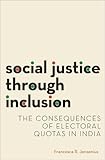Social justice through inclusion : The consequences of electoral quotas in India / Francesca R. Jensenius.
Series: Modern South AsiaPublisher: New Delhi Oxford University Press, 2017Description: xv, 228 pages ; 25 cmContent type:- text
- unmediated
- volume
- 9780190646608 (hardback)
- 9780190884994
- Representative government and representation -- India
- Proportional representation -- India
- Dalits -- Political activity -- India
- Social justice -- India
- Caste -- Political aspects -- India
- Legislative bodies -- India
- Political participation -- India
- POLITICAL SCIENCE / Government / Comparative
- SOCIAL SCIENCE / Ethnic Studies / General
- India -- Politics and government -- 1947-
- 323.3294 JEN 23
- JQ281 .J47 2017
- POL009000 | SOC008000
| Item type | Current library | Call number | Status | Date due | Barcode |
|---|---|---|---|---|---|
 BOOKs
BOOKs
|
National Law School | 323.3294 JEN (Browse shelf(Opens below)) | Available | 36913 |
Includes bibliographical references and index.
Machine generated contents note: -- Acknowledgments -- A note on terminology -- 1. The Effects of Political Inclusion -- 2. From Representation to Integration -- 3. Whose Representative? -- 4. Quotas and Development -- 5. A New Political Elite -- 6. Quotas and Political Participation -- 7. Status and Recognition -- 8. Chipping Away at the Caste Hierarchy -- 9. Trade-offs in Institutional Design -- Appendices.
"Across the world, governments design and implement policies with the explicit goal of promoting social justice. But can such institutions change entrenched social norms? And what effects should we expect from differently designed policies? Francesca R. Jensenius' Social Justice through Inclusion is an empirically rich study of one of the most extensive electoral quota systems in the world: the reserved seats for the Scheduled Castes (SCs, the former "untouchables") in India's legislative assemblies. Combining evidence from quantitative datasets from the period 1969-2012, archival work, and in-depth interviews with politicians, civil servants, and voters across India, the book explores the long-term effects of electoral quotas for the political elite and the general population. It shows that the quota system has played an important role in reducing caste-based discrimination, particularly at the elite level. Interestingly, this is not because the system has led to more group representation - SC politicians working specifically for SC interests - but because it has made possible the creation and empowerment of a new SC elite who have gradually become integrated into mainstream politics. This is a study of India, but the findings and discussions have broader implications. Policies such as quotas are usually supported with arguments about various assumed positive long-term consequences. The nuanced discussions in this book shed light on how electoral quotas for SCs have shaped the incentives for politicians, parties, and voters, and indicate the trade-offs inherent in how such policies of group inclusion are designed. "-- Provided by publisher.
"What are long-term effects of India's extensive electoral quota systems? This book's insightful discussions, backed by rich empirical data, show how the quotas have shaped incentives for politicians, parties, and voters, and indicate the trade-offs inherent in how such policies of group inclusion are designed"-- Provided by publisher.

There are no comments on this title.